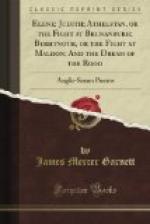Fate’s secrets reveal, as thou askest in words,
The law from beginning forth to the end. 590
He is before earth of noble race,
Wise in word-craft and son of a prophet,
Bold in council. To him ’tis inborn
That he the answers clever may have,
Knowledge in heart. He to thee shall declare 595
’Fore the crowd of men the gift of wisdom
Through mickle might, as thy mind desires.”
In peace she permitted each one to seek
His own [dear] home, and him alone took,
Judas, as hostage, and earnestly prayed 600
That he of the rood would rightly teach,
Which of old in its bed was long concealed,
And she himself apart to her called.
Helena spake to him alone,
Glory-rich queen: “For thee two are ready, 605
Or life or death, as liefer shall be,
To thee to choose. Now quickly declare
To which of the two thou wilt agree.”
Judas to her spake again (he might not the sorrow avoid,
Avert the ire of the empress.[2] In the power of the queen was he): 610
“How may him befall who out on the waste,
Tired and foodless, treads the moorland,
Oppressed with hunger, and bread and stone
Both in his sight together[3] shall be,
The hard and the soft, that he take the stone 615
For hunger’s defence, care not for the bread,
Return to want and reject the food,
Renounce the better, if both he enjoys?”
[1] Lit., ‘under the lap (or bosom) of sins.’
[2] MS. rex (Latin?), Z.;
‘oppression of care’ (cearces),
Gn.; ‘of
hunger’ (ceaces), Gm.; ‘of smoke’
(reces),
Schubert;
rex = cyninges, Sievers and W.
[3] Z.
VIII.
To him then the blessed answer returned,
Helena ’fore earls without concealment:
620
“If thou in heaven willest to have
Dwelling with angels and life on earth,
Reward in the skies, tell me quickly
Where rests the rood of the King of heaven
Holy ’neath earth, which ye now long
625
Through sin of murder from men have concealed.”
Judas replied (his mind was sad,
Heat in his heart and woe for both,
Whether hope of heaven with [all] his soul
He should renounce, along with his present
630
Kingdom ’neath skies, or show the rood):
“How may I that find that long ago happened
In course of winters? Now many are gone,
Two hundred or more, reckoned by number;
I may not recount, now the number I know not.
635
Now many have since departed this life,
Of wise and good who were before us,
Of clever men. In youth was I
In later days afterwards born,
A child in years. I cannot what I know not




